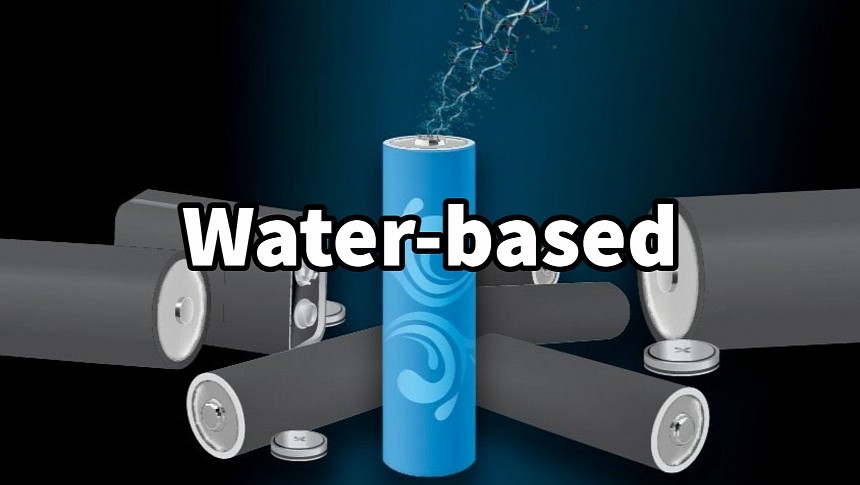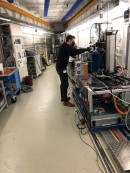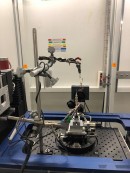Scientists work on new types of batteries that could be safer, more energy dense, or cheaper than existing Li-ion cells. Water-based batteries are promising, but they have a low energy density. Researchers at Texas A&M University think they found a solution to increase their storage capacity 1,000 times.
People are sometimes annoyed that all the good things about batteries only happen in the lab or computer simulations. Current Li-ion batteries appear to not progress much, making many skeptical about the future of battery-electric vehicles. People tend to forget that Li-ion batteries that power everything today were still in a lab not long ago. The first studies on Li-ion batteries date back to the 1960s, yet the first commercial batteries only appeared in the 1990s. That's 30 years of painstaking lab research, and yet, here we are, powering everything from Li-ion batteries.
That's why learning what scientists are working on today is fascinating. In some cases, they have studied their novel technologies for a long time. This means it's likely to see their work in a commercial product rather soon. In other cases, the effort is still in an early stage, and it will take a long time, perhaps more than 30 years, to have a breakthrough battery in production. Water-based batteries are in the latter category, but are not less fascinating.
Researchers at Texas A&M University believe they have not been studied enough and are working tirelessly to improve their characteristics. The scientists, led by Chemical engineering professor Dr. Jodie Lutkenhaus and chemistry assistant professor Dr. Daniel Tabor, aim to research metal-free water-based batteries that could someday replace Li-ion batteries.
These batteries could be an alternative when raw materials become scarce or expensive. They can also have a more stable supply chain because they don't use rare materials. Another big advantage over Li-ion is their increased safety, thanks to the water-based chemistry. These are theoretical advantages because scientists are still trying to find the right chemical composition for their elements.
The water-based batteries researched at Texas A&M University consist of a cathode and an anode made of polymers that can store energy. The electrolyte is water mixed with organic salts and is crucial to ion conduction and the battery's energy storage capacity. That's why finding the right materials is important, as the researchers discovered that different compositions could have vastly different results.
"If an electrode swells too much during cycling, then it can't conduct electrons very well, and you lose all the performance," Lutkenhaus said. "I believe there is a 1,000% difference in energy storage capacity, depending on the electrolyte choice because of swelling effects."
The article published in the Nature Materials journal shows that redox-active, non-conjugated radical polymers (electrodes) are promising candidates for metal-free aqueous batteries thanks to the polymers' high discharge voltage and fast redox kinetics. Still, the reactions are difficult to predict because of the increased process complexity. The researchers are using experiments and computational simulations to speed up their work. If successful, their work will pave the way to lithium-free batteries.
That's why learning what scientists are working on today is fascinating. In some cases, they have studied their novel technologies for a long time. This means it's likely to see their work in a commercial product rather soon. In other cases, the effort is still in an early stage, and it will take a long time, perhaps more than 30 years, to have a breakthrough battery in production. Water-based batteries are in the latter category, but are not less fascinating.
Researchers at Texas A&M University believe they have not been studied enough and are working tirelessly to improve their characteristics. The scientists, led by Chemical engineering professor Dr. Jodie Lutkenhaus and chemistry assistant professor Dr. Daniel Tabor, aim to research metal-free water-based batteries that could someday replace Li-ion batteries.
These batteries could be an alternative when raw materials become scarce or expensive. They can also have a more stable supply chain because they don't use rare materials. Another big advantage over Li-ion is their increased safety, thanks to the water-based chemistry. These are theoretical advantages because scientists are still trying to find the right chemical composition for their elements.
The water-based batteries researched at Texas A&M University consist of a cathode and an anode made of polymers that can store energy. The electrolyte is water mixed with organic salts and is crucial to ion conduction and the battery's energy storage capacity. That's why finding the right materials is important, as the researchers discovered that different compositions could have vastly different results.
"If an electrode swells too much during cycling, then it can't conduct electrons very well, and you lose all the performance," Lutkenhaus said. "I believe there is a 1,000% difference in energy storage capacity, depending on the electrolyte choice because of swelling effects."
The article published in the Nature Materials journal shows that redox-active, non-conjugated radical polymers (electrodes) are promising candidates for metal-free aqueous batteries thanks to the polymers' high discharge voltage and fast redox kinetics. Still, the reactions are difficult to predict because of the increased process complexity. The researchers are using experiments and computational simulations to speed up their work. If successful, their work will pave the way to lithium-free batteries.







